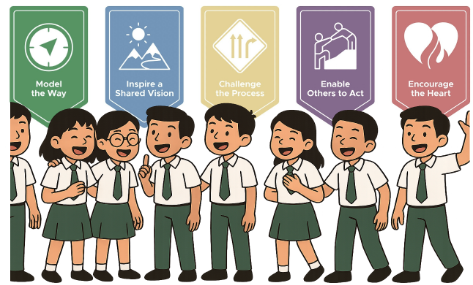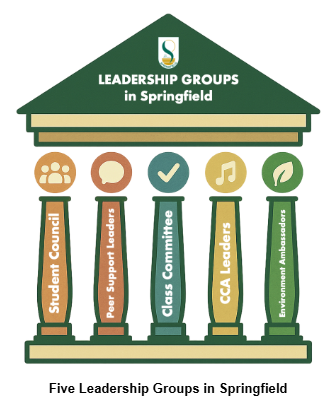Student Leadership Overview
Student Leadership
At Springfield, we believe in fostering leadership at all levels, rooted in our deep belief and vision to develop every Springfielder with the confidence to lead - for every student to not only recognize their potential as a leader but also to embrace it through actionable learning and experiences.
Leadership Development in Springfield
Our leadership development approach is based on a tiered structure, ensuring that leadership opportunities are accessible to all students, while also providing more targeted and specialized training for distinct leadership groups.
Leadership development in Springfield takes alignment from the Kouzes
and Posner Leadership Challenge, which emphasizes the MICEE principle of
(1) Modelling the way; (2) Inspiring a
shared vision, (3) Challenging the process; (4) Enabling
others to act; and (4) Encouraging the heart.

Kouzes and Posner’s Five Practices of Exemplary Leadership
Broad-Based Leadership for All Springfielders
At the heart of our approach is a strong commitment to broad-based leadership development.
All Springfielders participate in leadership activities and undergo foundational
leadership modules prior to key Student Development Experiences (SDEs).
This structure is designed to build confidence, foster collaboration, and
create meaningful opportunities for students to lead, regardless of the
size of the role.
Through this approach, we equip students with essential life skills such as communication, problem-solving, and emotional intelligence. These are core components of positive education, enabling our students to grow into empathetic, responsible individuals who can contribute meaningfully to their communities.
Targeted Development for Student Leadership Groups
In addition to our broad-based leadership initiatives, Springfield offers specialised training and development to support the five distinct student leadership groups in the school, viz., (1) Student Councillors; (2) Peer Support Leaders; (3) Class Committee; (4) CCA Leaders; and (5) Environment Ambassadors. These groups represent diverse leadership functions and play vital roles in shaping the tone and culture of our school.

At Springfield, all student leadership roles are valued equally. While their areas of influence and responsibilities differ, each role carries its own distinct value proposition and comes with unique opportunities for growth and service. This approach reinforces our belief that leadership is not defined by title, but by purpose and impact.
All student leaders begin their journey together through a standardised Student Leaders Training programme, which grounds them in shared values, core competencies, and a common leadership identity. Beyond this, they have the opportunity to deepen their development through skills-based or events-based training tailored to their respective roles. These specialised sessions allow each leader to grow more confidently into their leadership identity and make meaningful contributions within their sphere of influence. The following outlines the distinct focus and development opportunities available to each group:
1. Student Council
The Student Council serves as the voice of the student body, advocating for their peers and ensuring that their needs and ideas are heard. Through structured mentorship and leadership workshops, Student Council members learn how to represent the student body with confidence and organise various school-wide events such as Friendship Week and Teachers’ Day.
2. Peer Support Leaders
Peer Support Leaders are key to building a caring and inclusive school environment. Through training in empathy, active listening, and conflict resolution, they support their peers and promote emotional well-being. As attentive listeners and advocates, they help shape a positive school culture and lead initiatives such as Inclusivity Week and welfare activities.
3. Environment Ambassadors
Our Environment Ambassadors take the lead for initiatives aimed at promoting sustainability and environmental responsibility within the school, such as Meat-Free Day and World Water Day. Their training focuses on advocacy, project management, and educating others about environmental issues, inspiring their peers to take ownership of their role in preserving the environment.
4. Class Committee
Class Committee members work closely with their Form Teachers to support the academic and social needs of their classmates. They have the autonomy to organise class bonding activities and play a key role in shaping class culture, contributing to a more cohesive and positive class experience.
5. CCA Leaders
Our Environment Ambassadors take the lead for initiatives aimed at promoting
sustainability and environmental responsibility within the school, such
as Meat-Free Day and World Water Day. Their training focuses on advocacy,
project management, and educating others about environmental issues, inspiring
their peers to take ownership of their role in preserving the environment.

